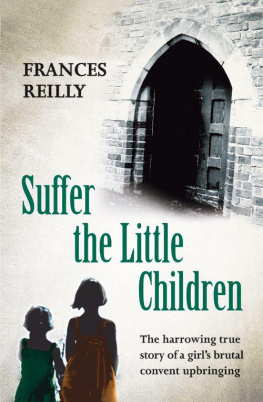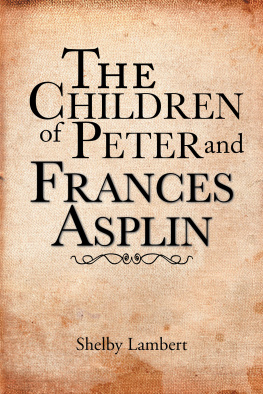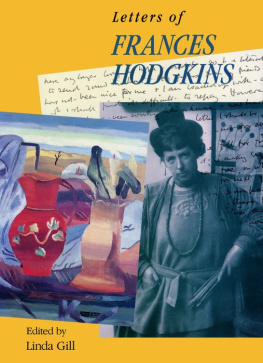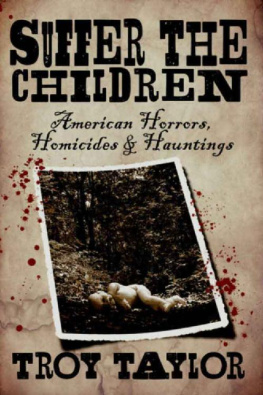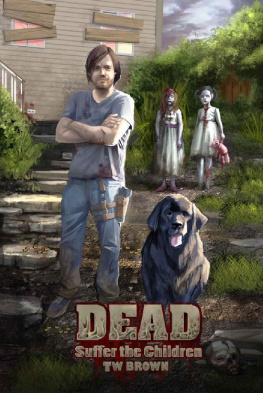Frances Reilly - Suffer The Little Children
Here you can read online Frances Reilly - Suffer The Little Children full text of the book (entire story) in english for free. Download pdf and epub, get meaning, cover and reviews about this ebook. year: 2010, publisher: Orion, genre: Non-fiction. Description of the work, (preface) as well as reviews are available. Best literature library LitArk.com created for fans of good reading and offers a wide selection of genres:
Romance novel
Science fiction
Adventure
Detective
Science
History
Home and family
Prose
Art
Politics
Computer
Non-fiction
Religion
Business
Children
Humor
Choose a favorite category and find really read worthwhile books. Enjoy immersion in the world of imagination, feel the emotions of the characters or learn something new for yourself, make an fascinating discovery.
- Book:Suffer The Little Children
- Author:
- Publisher:Orion
- Genre:
- Year:2010
- Rating:3 / 5
- Favourites:Add to favourites
- Your mark:
- 60
- 1
- 2
- 3
- 4
- 5
Suffer The Little Children: summary, description and annotation
We offer to read an annotation, description, summary or preface (depends on what the author of the book "Suffer The Little Children" wrote himself). If you haven't found the necessary information about the book — write in the comments, we will try to find it.
Suffer The Little Children — read online for free the complete book (whole text) full work
Below is the text of the book, divided by pages. System saving the place of the last page read, allows you to conveniently read the book "Suffer The Little Children" online for free, without having to search again every time where you left off. Put a bookmark, and you can go to the page where you finished reading at any time.
Font size:
Interval:
Bookmark:
Frances Reilly does not know when she was born. She spent the formative years of her childhood imprisoned within the walls of the Poor Sisters of Nazareth Convent and finally escaped with the help of a local MP. Having moved to England, she now lives in Colchester with her family.
AN ORION EBOOK
First published in Great Britain in 2008 by Orion Books
This ebook first published in 2010 by Orion Books
Copyright 2008 Frances Reilly
The right of Frances Reilly to be identified as the author of this work has been asserted by her in accordance with the Copyright, Designs and Patents Act 1988.
All rights reserved. No part of this publication may be reproduced, stored in a retrieval system or transmitted in any form or by any means, without the prior permission in writing of the publisher, nor to be otherwise circulated in any form of binding or cover other than that in which it is published without a similar condition, including this condition, being imposed on the subsequent purchaser.
A CIP catalogue record for this book is available from the British Library.
ISBN: 978 1 4091 1123 8
The Orion Publishing Group Ltd
Orion House
5 Upper Saint Martin's Lane
London WC2H 9EA
An Hachette UK Company
www.orionbooks.co.uk
To protect the innocent, some of the names and details in this book have been changed. All the events described actually occurred.
To Josephine,
for your friendship.
This book is for us both.


To my sons Darren and Christopher thank you for all your encouragement and support during the process of writing this book. It meant a lot to me.
To my granddaughter Ellisa thank you sweetheart for all your support and for sending all the good luck cards and text messages. I love you x
To my grandson Kieran thank you my wee darling for having loads of faith in me and for all your support and kisses. Love ye lots x
To Kevin Young, my ex-husband and very good friend I cant really thank you enough for all your encouragement and support with the court case and this book. Your hard work and advice at very stage of the book have been invaluable.
To Ann-Marie Hanna thanks for your support with this book and for having the strength to come forward as a witness. I hope this book does not bring back too many bad memories.
Special thanks also to my agent Robert Smith for your complete belief in me and in the book, and for your determination and passion to see it published. Thanks also for your continued advice and friendship.
To Rebecca Cripps thanks for all your help with the editing of my book.
Many thanks to Amanda Harris and all the other dedicated people at Orion who helped with the publication of this book.
Special thanks to my counsellor Merril Mathews, for caring so much. Talking with you helped me to put everything into perspective; helping me move on with my life. Your warm, caring personality makes you a very special person.
To the two policemen at the Child Rape Unit in Belfast (you know who you are), thank you for your gentle understanding and for the respectful way you treated me.
Finally, thanks to my legal team in Belfast. With special thanks to my solicitor, Ceiran McAteer, for his mild manner, gentle understanding and for coming to my rescue. And to Emily, his secretary, for her hard work, continued support and for always being there at the end of the phone.
Frances Reilly
May 2008

This is the true story of my childhood in care. My sister Loretta was six and I was two when our nightmare began, so the first chapter of the book is based on what she later told me; the rest I remember only too well.

Look at this, Frances, my ex-husband, Kevin, said, pointing to an article in the newspaper.
My eyes swam as I read the first paragraph. A group of women in Scotland were taking an order of nuns to court for abusing them during their childhood.
The Poor Sisters of Nazareth, I gasped. I felt dizzy and found it hard to breathe.
The Scottish women were taking action against the same order of nuns who had abused me for most of my childhood; some of the women were around my age.
Vivid, unwanted memories flooded into my mind. It didnt feel like it had all happened more than thirty years ago; suddenly, it was all so fresh that it seemed like only months ago. Filled with panic, I found myself unable to read on, so Kevin read the article to me. As I listened to these womens stories they all rang true to me, and I could feel their pain. I wasnt surprised or shocked, as some readers might have been, and I really hoped that these women would be listened to and believed.
Id left the convent a very damaged person, carrying with me a lot of emotional problems. I was often severely depressed and on many occasions contemplated suicide. There didnt seem to be anyone outside the convent who understood what I was feeling. Because of the troubles in Northern Ireland, I didnt come into contact with anyone who wasnt a Catholic, and whenever I tried to speak out about the abuse I wasnt believed. People didnt want to hear a bad word said about the Catholic religious orders. No one back then would have gone up against them.
I learnt quite quickly to keep my mouth shut and to suppress my feelings. I tried to push all the bad memories out of my mind, to pretend that they hadnt happened and to behave as normally as I could. This made it easier for me to be accepted in the Catholic housing estates where I was living at the time. I didnt report the abuse to the police because I was sure they wouldnt believe me, or wouldnt want to know.
Once I accepted that people didnt want to believe or hear what I was saying, I had to find a way to survive. Over time I developed two survival mechanisms. First, I tried to hide the most painful memories by putting on a front. Every day I was living a lie. On the outside I was outgoing and cheerful, but inside I never stopped hurting. Also, I erected barriers to stop people, except my children, from getting close and hurting me.
While my children needed me, these mechanisms worked well enough, although I struggled, especially with relationships. Sometimes it all became too much: the mask would slip, and I would sink into a deep depression. As my children became less dependent, my defences started to fail, and by the time theyd left home, they had collapsed completely. The memories Id tried to bury returned to haunt me, and the barriers Id erected began to collapse. My life started to fall apart. Flashbacks to the convent became much more regular. I started to get frequent panic attacks and developed severe agoraphobia. Id always suffered from periods of depression, but these became more pronounced.
My cleaning compulsion developed into obsessive-compulsive disorder; I exhausted myself by repeatedly cleaning and tidying, doing work that didnt need doing; I imagined that germs were everywhere and that I had to protect myself and my family against them. I would panic if I ran out of bleach and nobody was about to go to the shops for me. If a family member moved one of my video cases so that it wasnt in line with the others, it would be enough to upset me for the whole day. I would cry if a baked-bean can wasnt neatly stacked on the correct shelf and facing outwards, and I shopped not for food but to restore order to my cupboards. I stopped eating properly and became anorexic. I was a mess. I became suicidal and knew that something had to change.
Font size:
Interval:
Bookmark:
Similar books «Suffer The Little Children»
Look at similar books to Suffer The Little Children. We have selected literature similar in name and meaning in the hope of providing readers with more options to find new, interesting, not yet read works.
Discussion, reviews of the book Suffer The Little Children and just readers' own opinions. Leave your comments, write what you think about the work, its meaning or the main characters. Specify what exactly you liked and what you didn't like, and why you think so.

